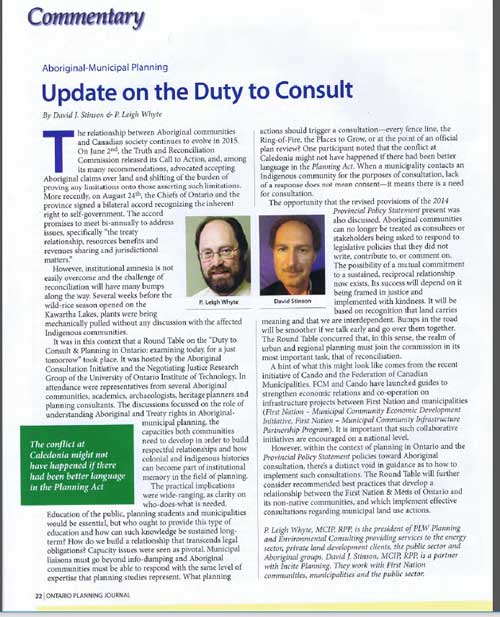Update on the Duty to Consult, by David J. Stinson and P. Leigh Whyte
The relationship between Aboriginal communities and Canadian society continues to evolve in 2015. On the 2nd of June, the Truth and Reconciliation Commission (TRC) released its Call to Action, and, among its many recommendations, advocated accepting Aboriginal claims over land and shifting of the burden of proving any limitations onto those asserting such limitations. More recently, on the 24th of August, the Chiefs of the Ontario and the Province signed a bilateral accord recognising the inherent right to self-government. The accord promises to meet bi-annually to address issues, specifically “the treaty relationship, resources benefits and revenues sharing and jurisdictional matters”.
However, “institutional amnesia” is not easily overcome and the challenge of reconciliation will have many bumps along the way. Several weeks before the wild-rice season opened on the Kawartha Lakes, plants were being mechanically pulled without any discussion with the affected Indigenous communities.
It was in this context that a Round Table on the “Duty to Consult & Planning in Ontario: examining today, for a just tomorrow” took place. It was hosted by the Aboriginal Consultation Initiative (ACI) and the Negotiating Justice Research Group (NJRG) of the University of Ontario Institute of Technology (UOIT). In attendance were representatives from several Aboriginal communities, academics, archaeologists, heritage planners, and planning consultants. The discussions focussed on: the role of understanding Aboriginal and Treaty rights in Aboriginal-municipal planning; the capacities both communities need to develop in order to build respectful relationships; and how colonial and indigenous histories can become part of institutional memory in the field of planning.
The practical implications were wide-ranging, as clarity on who-does-what is needed. Education of the public, planning students, and municipalities would be essential, but who ought to provide this type of education, and how can such knowledge be sustained long-term? How do we build a relationship that transcends legal obligations? Capacity issues were seen as pivotal. Municipal liaisons must go beyond info-dumping and Aboriginal communities must be able to respond with the same level of expertise that planning studies represent. What planning actions should trigger a consultation, every fence line, the “Ring-of-Fire”, the “Places to Grow”, or at the point of an Official Plan review? One participant noted that the conflict at Caledonia might not have happened if there had been better language in the Planning Act. The notion of collaborative mapping is a distinct possibility; yet not all information can be shared. When a municipality contacts an Indigenous community for the purposes of consultation, lack of a response does not mean consent -- it means there is a need for consultation.
The opportunity that the revised provisions of the 2014 Provincial Policy Statement present was also discussed. Aboriginal communities can no longer be treated as “consultees” or “stakeholders” being asked to respond to legislative policies that they did not write, contribute to, or comment on. The possibility of a mutual commitment to a sustained, reciprocal relationship now exists. Its success will depend on it being framed in justice and implemented with kindness. It will be based on recognition that land carries meaning and that we are interdependent. “Bumps in the road” will be smoother if we talk early and go over them together. The Round Table concurred that, in this sense, the realm of urban and regional planning must join the TRC in its most important task, that of reconciliation.
A hint of what this might look like comes from the recent initiative of Cando and the Federation of Canadian Municipalities (FCM). They have launched guides to strengthen economic relations and co-operation on infrastructure projects between First Nations and municipalities (First Nations – Municipal Community Economic Development Initiative: http://www.fcm.ca/home/programs/community-economic-development-initiative.htm; First Nations – Municipal Community Infrastructure Partnership Program: http://www.fcm.ca/home/programs/community-infrastructure-partnership-program.htm) . It is important that such collaborative initiatives are being encouraged on a national level.
However, within the context of planning in Ontario and the Provincial Policy Statement policies toward Aboriginal consultation, there’s a distinct void in guidance as to how to implement such consultations. The Round Table will further consider recommended best practices that develop a relationship between the First Nations & Métis of Ontario and its non-native communities, and which implement effective consultations regarding municipal land use actions.
P. Leigh Whyte is the President of PLW Planning and Environmental Consulting providing services to the energy sector, private land development clients, the public sector, and aboriginal groups. He can be reached at: leigh@plwconsulting.com. David J. Stinson is a Partner with Incite Planning. They work with First Nation communities, municipalities, and the public sector.

